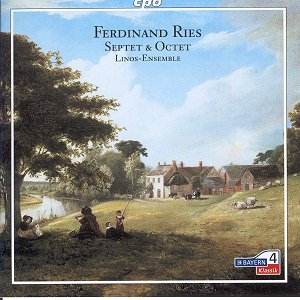The German CPO label
specialises in rare repertoire and this
release of chamber music from the Bonn-born
composer Ferdinand Ries certainly fits
that bill. And itís not the first time
CPO have championed Ries. Thereís almost
a dozen releases featuring works from
his prolific output.
A talented pianist,
Ferdinand Ries was a pupil of Beethoven
for three or so years and the influence
of the great composer is amply evident
in his scores. It is quite natural that
Ries should imitate his mentor. However,
no matter how impressive the endeavour
it is no surprise that the pupil fails
to achieve the inspiration and imagination
of his great master.
Ries composed his Grand
Septet in 1808, during a time of
great despair and frightening insecurity
in Paris where he was living at that
time. The four movement work was probably
written with the intention of allowing
the composer to improve his own concert
performance skills in a chamber work.
With war raging throughout Europe, there
would have been little in the way of
orchestral resource for a piano concerto,
so programming a chamber piece was a
more practical proposition.
The lively and tasteful
opening movement of the Grand Septet,
marked adagio molto, is noteworthy
for the plentiful use of arpeggios in
the piano part. The highly gifted Linos
Ensemble provide a fine interpretation
that is bright and summery. The players
display their commendable musicianship
in the contrasting demands of the mournful
second movement funeral march and the
vivacious scherzo. The ensemble give
a charming and jaunty account of the
imaginative and highly melodic closing
movement.
The Grand Octet
was composed whilst Ries was living
in London in 1816. At this time Ries
was gaining considerable recognition
as a composer, pianist and piano teacher
and had become rather a celebrity in
some European circles. The Grand Octet
was composed for the Philharmonic Society
with the intention that Ries would play
the solo part to showcase his virtuoso
skills to the fashionable London concert
audience. At that time it was common
for chamber works to be presented in
the context of a symphony concert.
The three movement
Grand Octet is highly appealing with
an extremely virtuosic role for the
piano. The piece commences heroically
like a piano concerto. The splendid
Linos provide perceptive and intelligent
playing in this forceful and rather
grand allegro. The players transmit
their affection in the generally relaxed
and gentle atmosphere of the central
movement andantino. The cheerful
and sunny mood continues in the closing
movement with the Linos performing with
considerable and compelling personality.
It is hard to resist
this high quality playing so aptly blending
infectious sparkle and joyous spontaneity.
The pianist Konstanze Eickhorst has
an impressive lightness of touch and
produces a beautiful tone throughout.
CPO are to be congratulated
on this well presented and admirably
recorded release. These colourful chamber
works certainly deserve to be better
known. This disc will delight those
who like to explore the lesser-known
music of the late classical period.
Highly recommended.
Michael Cookson


